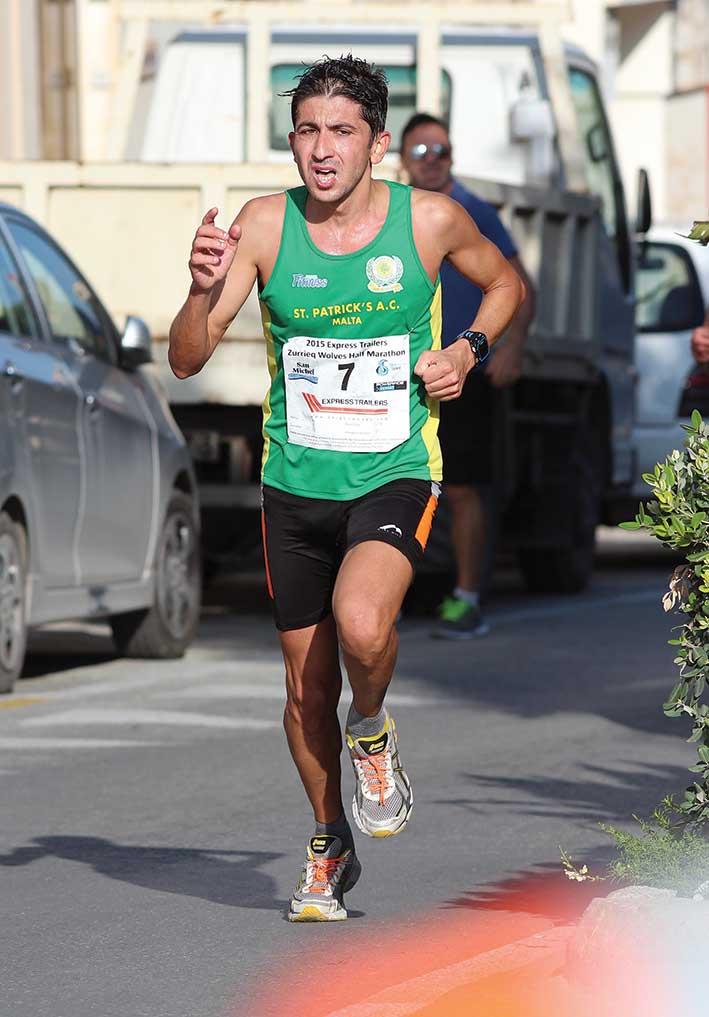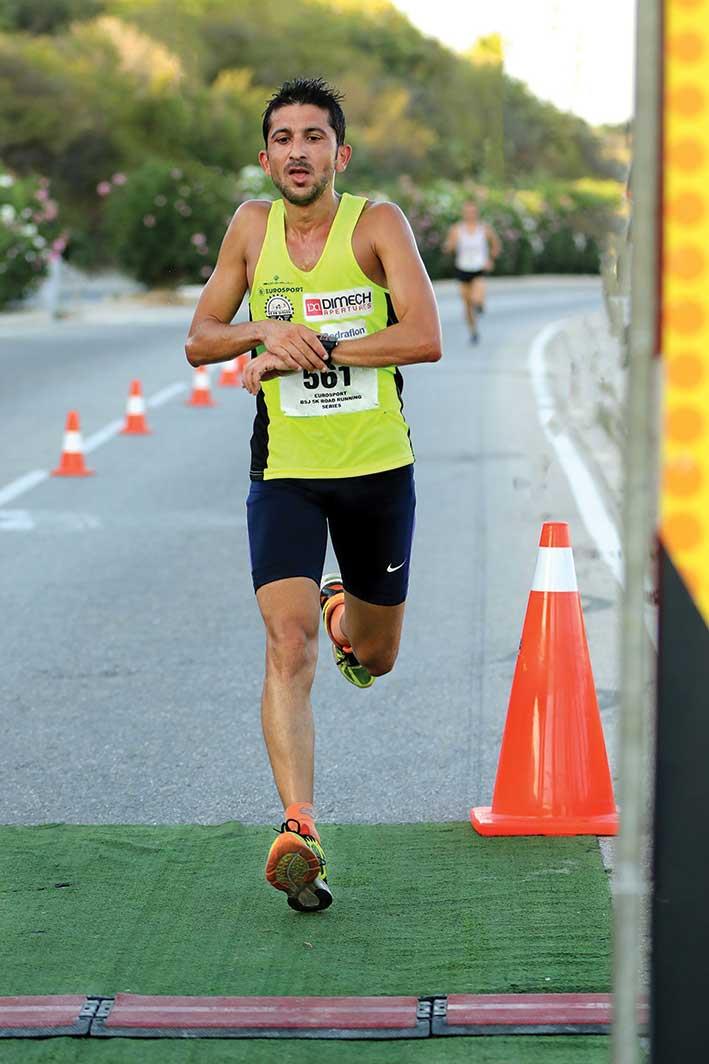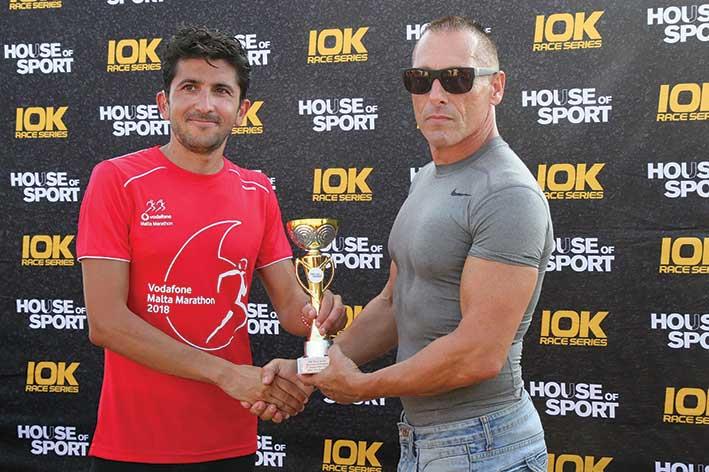The spotlight today is on George Vella, 39, Administrative Officer working as a Quantity Surveyor - Draughtsman within the Housing Authority, deaf since birth, avid lipreader and sign language user, listed as an 800m Maltese Champion in 2001, a top long-distance runner, the silent Georgierun hasn't yet stopped running. He has records of local and international races abroad, even switched to Triathlon and returned back to Road Running races. Consistent races, high performances, insatiable and eager to improve personal records.

1. George, you are still quite young for a long-distance athlete and yet you have been into running for decades now. You were into other sports such as waterpolo but I reckon you got hooked to running, the passion which left in you an indelible mark. Please recall some of your running experiences and how it all started. What was the turning point that led you to take running as part and parcel of your lifestyle?
Looking back 22 years ago, at the age of 17 years, in September 1997 I started jogging easily across the Sliema coastline admiring the waterpolo pitches with "nostalgia" as I used to play with Exiles U/17 during the Summer months. During my jogging, my running pace got better and this encouraged me to start participating in road races so I wouldn't miss out on an opportunity in sportsmanship. After joining the Athleta Pembroke club with the help of Viktor Camilleri, I used to train more leisurely through winter and did a few track sessions twice weekly. It was not easy to specialize on speed works on tracks with spike shoes, until patience gave room for better results. I started a few 5km & 10km road races then the following years I specialized in an event.
The great season of 2000/2001 arrived when I was coached by Mr. Donato Sabia, an Italian middle distance who came 5th in 1984 Olympics Games in 800m. I was grouped with some good sprinters and middle-distance athletes and we used to train 3 or 4 times weekly and my sessions consisted of sprints, speed endurances, long intervals and weights & drills. Training was hard but the pain was well worth it. Donato helped me reach a higher level to a sub 2-minute barrier in 800m, within one season. I participated in Deaflympics held in Rome in July 2001 where I placed 12th overall out of 40 athletes in the 800m event, with 1m59.90s.
From this time on, the following races were within same level, improving by narrow seconds since every second in this event is a struggle to beat. Unfortunately, Donato has to return back home in Italy and it was a big blow not just for me, but also for other Maltese athletes. So, in 2002, I encountered a few problems pertaining to coaching until 2003 where I reached my athletics' background aim for the Gsse held in Malta. I joined AAAC and started with new coach Ralph Mifsud. My 800m races in Malta were so good that I dropped to PB of 1m57.10 (hand timed), but it was not enough for selection into Gsse although the standard was good. Since I lacked power, I decided not to blame anyone and accepted the participation of my rivals instead thereby feeling proud with my performances myself and moved on.
Then afterwards by mid-May 2003, I felt an injury in the right knee which put me 6 months down doing nothing on tracks. It was reluctant to accept and hard to motivate myself also especially following good performances. So I decided to keep swimming and doing weights to strengthen my muscle around the knee. My determination kept me fit both physically and mentally which was very difficult during those hard moments. Until back on track again in January 2004, I caught up with a normal pace rhythm and I returned to previous performance. This led to my participation in European Deaf Indoors Championship held in Sofia, Bulgaria where I qualified to the semi-final although I was not accustomed to running on such short sloping tracks! I am not sure if it was first time for a Maltese 800m runner participating indoors.
Then the following year 2005 again another injury hit me on left calve, this time it was harder to heal. I tried my best to remain with my same sheer determination for quicker recovery but as time passed by, I felt I needed to change something. So I cycled in a gym, swam more in free time, also did more weights. The same routine led me to a stronger endurance which helped my recovery speed. But it changed me completely; I ended up switching from tracks to another sport, the Triathlon. It was a changing moment and so I tried a funny short triathlon for beginners and I completed it well. I decided to move on with this new sport and have been taking it seriously to date.
This time with combination of: swims in the National pool in the morning before work 3 times weekly with a swimming coach, followed with some endurance cycles with my racer, and some runs, my progress in triathlon races seems to be going well that I am ranked in the top 5 places. Also participating in local cycling races, local sea swim races and other races made me more confident for such strenuous Triathlon. Furthermore I participated in other races abroad like European Cross Country with Deaf in Portugal 2006 followed by a 3rd place in Aquathlon in the Uk within the same week.
This was helpful for my sports' career as my triathlon history increased so that I got podiums for 3 consecutive years in an annual 113km (Half Ironman) held in Malta between 2009-2011. Also I got selected for GSSE in sports of Triathlon (Olympic Event) in March 2011 held in Cyprus. Moreover I completed my longest race of Ironman (3.8km swim, 180km cycling followed by running Marathon) in June 2009 in Kartnen, with time of 10hr 42mins.
By 2012/13, I switched back to running tracks since I was aiming again for the Deaflympics 2013 that was held in Sofia and there were no triathlon events. Being 33, it wasn't easy to qualify in such short fast 800m event. With guidance of Leandros Calleja, I achieved this aim by running 2'01 in a local race, where I ended up running as veteran with strong fast young athletes. Then the following year I tried to switch again to Triathlon sessions but realized I had difficulties in cycling.
So by April 2015, I returned back to Long distance running quietly and joined my present coach David Galea, National Record holder of Ironman. One month after I joined him, I ended up on the podium on the 1st Edition of Deaf European Marathon Championships held in Lublin Poland. My silver medal grab from this 42.2km event was memorable one and I felt honoured to put Malta in front within big countries. Simultaneously, I gave a silent reply that Deaf sportive athletes should be recognized well locally. Moreover, I dedicate this to people who hindered my participation in various events since I started sports.

2. George, having such a communication barrier was not an easy task for you but for anyone who wanted to talk to you. Reflecting upon your old school days, I feel a bit baffled. Describe your lessons then. Did you avail of some school support to assist you better or you had to cope like normal students? When were your most difficult times encountered and at what stage of your education?
Barriers that I faced during my educational life were: inaccessibility to communication and information, as there were no available Interpreters of Maltese Sign Language (until 2001) during my formal education. I experienced lack of information as I could not hear the teachers speaking especially during my educational development; lack of technology such as internet, mobile to obtain information rapidly, and I had very few friends to help me socialize well. Honestly my parents were my role models and used to take care of me especially my mother as she was a teacher and so she used to explain and write notes so that I can write summaries and revise well for exams.
Now regarding Education, mainly Deaf people were in a mainstreamed school and not in a special education school. In fact the decision of being placed in this mainstreamed school was taken either by family or professionals. I was mainstreamed at Primary School in St. Julians, Junior Lyceum Hamrun and the Technical Institute Paola. Normally in mainstreamed schools, this time, negative attitudes from hearing students and teachers arose well and negatively affected Deaf people who didn't have a chance to talk or express their feelings.
Later on I graduated an evening course from University of Malta 2008-2010 in Baroque Architecture with the help of my Interpreters. Now there are Interpreters of Maltese Sign Language working with Deaf students and this service began since 2001 just a year after I finished school! Deaf Students are nowadays offered with this service during some lessons where it is hard to understand important information.

3. George, you are a highly competitive athlete and your outstanding performances can vouch for all this. Being deaf, however, is not an easy feat especially when you compete locally with normal athletes. You were an 800m runner and every fraction of a second counts. How were you assisted during starts? I may surmise that the flaws which you might have encountered locally were surely catered to differently and better abroad especially in your various participations in the Deaflympics. What are the aids for the start which are different from here? Describe your experiences in such important International events?
I am proud to have participated in 4 Deaflympics of: Roma 2001, Taipei (Taiwan) 2009, Sofia (Bulgaria) 2013 and Samsun (Turkey) 2017. Of course, there is qualifying standard to be achieved to represent and the Standard is hard to achieve for a local athlete from small country, together with responsible duties as athlete. Moreover, the Deaf Sports Association of Malta has to be member and in good standing with Deaflympics. Unfortunately, being a Maltese Deaflympian, like Paralympians, who are not wholly recognized, I had to end up forking out expenses for each participation abroad. Then I have to wait months for compensation, either less or full, from a SportMalta scheme.
So following back my history as normal athlete with St. Patricks since I changed Triathlon, I have experienced different moments in different disciplines of sport. Especially when I discovered the feeling of sportsmanship 22 years ago. Sports helped me integrate into society better, avoiding hectic routine and finally made me develop an open, stronger character.
Locally I am still running various road races ranging from 5km till Full Marathons, sometimes track races since my speedwork is diminishing by age physically. Having a pb of 2hr 49mins in last year Malta marathon and some other sub 3hrs marathons both locally and abroad makes me more determined to keep smarter and be an efficient runner. It depends on my commitments and training routine as I am involved in voluntary works within three associations, as well as my present Full time work.
Being a Deaflympian athlete here in Malta is not always easy. We have hidden barriers, so do Paralympians and it affects participation in sports in different ways. A coach or a club, may find it difficult to understand the difficulties that impede these athletes to perform equally, both locally & abroad. With my responsibility as President of the Deaf Sports Association of Malta I am assisting and encouraging Deaf athletes to participate equally as we are very few Deaf sportive athletes. I am ready to accomplish the same aims with the future Paralympians athletes within the new Malta Paralympics board.
So albeit these meetings, hectic training and other personal commitments, I am trying my best to acquire another aim: defending the podium finish in the next edition of 2nd Deaf European Marathon Championships to be held in Essen, Germany.

4. George, apart from being an athlete, you find time to assist fellow athletes by coaching them regularly. Training for marathon is extremely time consuming so managing to even be of assistance to others is incredibly commendable. Today, communication can come much easier than before. In the past, am sure you faced problems with communicating every single instance, today things are by far better thanks to the great development in technology. You are a generous person and am sure your athletes really appreciate this ongoing gesture. How do you find yourself as a coach? Do you think when the time is ripe to hang up your runners, you will embark on coaching? What are your feelings about differences between running and coaching?
I started coaching a group of athletes varying from sprinter to long distance athletes, some of them even completed Full Marathon. I decided to take this new challenge up after gaining experience in athletics' background also analyzing weaknesses in athletes individually is a serious commitment, strengthening them well in progression according to their aims. I am glad that some of my athletes are Deaf too. We didn't even have a communication problem, but it was harmonious teamwork of Team Georgierun. Currently I am involved in voluntary works with three groups: Deaf Sports Association of Malta (President), Malta Paralympics Committee (Vice-President), & Council member of Maltese Sign Language.

5. George, you are an athlete who strives hard to improve your performance times. Being realistic, which distances do you think you stand more of a chance to improve and why?
For now I am able to improve in marathons and maybe longer distances depending on how much my legs can be able to cope with these training weekly mileages and depending on my maximum running pace. But technically predicting race times, especially for marathons, can be tough because there are so many variables, such as weather and course conditions. Now knowing many younger runners have, over the years, practiced their typical training pattern on a weekly/monthly schedule. And for much of my running life, I did the same. In fact I am 39 now, having quality hard efforts during my training with my coach, also builds confidence. I am still looking forward to a few successful marathons.

6. George, it is a fact that we are living in loud and noisy environments! At times, we get frustrated so fast about very little, temperature flares, pressure soars, swearwords fly in industrial quantity and patience bygones! .... You are immune to all this! There is always silence surrounding you, which at times it has its advantages too. What are your views on this? I read that lip reading has its percentage of error too. Do you recall an incident where you misinterpreted the whole concept?
Deaf people are divided into categories such as: Lipreaders, Sign Language users and both. Every category has its specific access, but it varies depending on what the place can offer Deaf people around. Our only social problem is Communication. Unfortunately, this problem is hardly recognizable due to hidden awareness within our society so together, along with Deaf people, I have to strive hard for communication. Even subtitles everywhere, like TV, cinemas and public places such as airports, are other technological means of assisting Deaf people enable full accessibility, but unfortunately locally it is not the case. Finally, I have to say, we can DO everything, except hearing such as hearing mobiles, announcers and other similar barriers. Technological means are one of our Human Rights like Interpreters of Maltese Sign Language as we depend mainly on these well too. In Malta there is only one Deafclub where people can meet, share experiences with each other in a user-friendly place of Maltese Sign Language.
Now lipreading is my lifeline, enabling me to be more confident and involved in communication, depending how other people talk to me. Using sign language is also important for me especially when using Interpreters' Service and meeting Deaf friends. But Lipreading is not always easy for me, because however if you are good at lipreading, then there are some situations that are difficult to follow such as small, unclear lips, dark places, quick talking, not wholly face to face, and so on. So lipreading is not precise because some sounds and words look very similar and because it relies so much on the lipreader's own background knowledge of language and on the quality of speech of the speaker.
Georgie, whilst thanking you for your kind time consumed in answering my questions, I would like to congratulate with you for all the achievements so far and look forward for more in the future. Keep running dear friend.